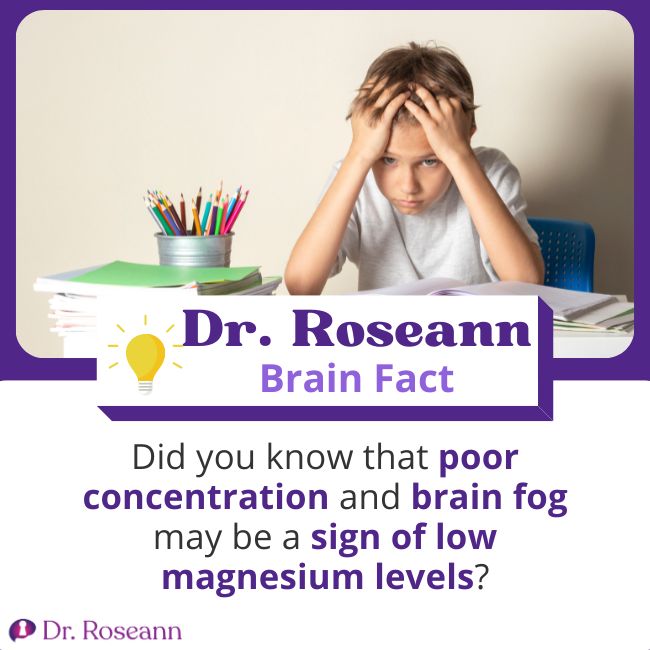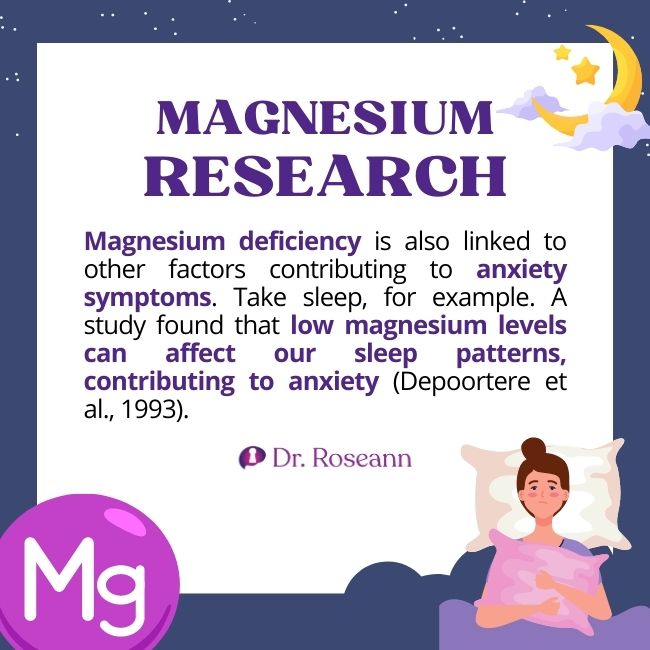Mental health and behavioral issues can be challenging, especially for kids. If you suspect your child to have anxiety, your priority should be finding effective ways to support their well-being as early as possible. You may start with improving their low magnesium levels.
The longer one suffers from worried thinking, the longer the behaviors become entrenched and much harder to change. Moreover, that means your child or teen is struggling more than they must.
The good news is that there are natural solutions for anxiety that are safe and effective.
One often overlooked aspect of mental health is the role of essential minerals like magnesium. Let's explore the potential benefits of magnesium for brain health, particularly when it comes to helping manage anxiety.
I remember Gina, a bright child who complains of excessive worry and anxiety. She feels her mind racing and her heart pounding all the time. Aside from anxiety, Gina also experienced abdominal cramps and had difficulty sleeping. These are signs of magnesium deficiency, so looking closely at Gina's magnesium levels through a blood test is essential.
What is Magnesium Good For?
Magnesium is an essential mineral that packs quite a punch to support our mental health. As magnesium is involved in over 300 biochemical reactions in the human body, it's safe to say it's a multitasking mineral. It supports the functions of the central nervous system, muscles, and nerves.
Magnesium affects our mental health because it helps regulate the brain's neurotransmitters. Neurotransmitters are chemical messengers that allow our brain cells to communicate with each other. Without magnesium, these neurotransmitters are trying to converse without words, which is confusing, to say the least!
One neurotransmitter magnesium influence is gamma-aminobutyric acid, or GABA for short. Now, GABA is like a calm and collected friend in our brain. It helps reduce anxiety, promotes relaxation, and checks our stress levels. Magnesium is like the best wingman GABA could ever ask for. It helps regulate GABA receptors, ensuring they function optimally and keep that anxiety at bay.
Furthermore, magnesium is also involved in regulating the HPA axis. HPA stands for the hypothalamic-pituitary-adrenal axis, which acts as the command center for our stress response system. So, when we're stressed, our HPA axis goes into action, releasing stress hormones like cortisol. Magnesium helps regulate this stress response.
Now, you may wonder, “How does magnesium even get to the brain?” It's a smart mineral because it can cross the blood-brain barrier. That means it can get past the gatekeeper of the brain that only lets in the most essential nutrients. Once inside, magnesium supports brain activity, enhances cognitive function, and promotes a healthy sleep cycle. That's how it unleashes its brain-boosting powers!
What is Anxiety?
Everyone feels anxious from time to time, so we all know how sneaky and pesky anxiety can be. But clinical anxiety is more than just feeling a little nervous or getting butterflies in your stomach before a big event. It's another level of worry and unease that can impact your daily life.
Picture this: your mind starts racing, your heart starts pounding, and your palms get sweaty—all because of what? Sometimes, it's for no apparent reason at all. Anxiety has a knack for playing tricks on us.
Experiencing anxiety is perfectly normal. It's our brain's way of alerting us to potential environmental threats or dangers. Like an internal alarm system, it kicks into gear when the body senses trouble. But here's the thing: that alarm system can go into overdrive for some of us.
If you have an anxiety disorder, your body's response goes to a higher level. Anxiety can manifest in different ways—generalized anxiety disorder, panic disorder, social anxiety disorder, and more. When anxiety throws a wild party in your brain, it will invite all its anxious friends to join in the chaos. That's when things can get a little rowdy.
Fear and intrusive thinking can take over.
Now, that's when magnesium enters the picture. Magnesium plays a role in managing anxiety symptoms because of its calming effect on our nervous system. As magnesium supports the function of GABA receptors and regulates the HPA axis, they work seamlessly together to keep anxiety in check.
Signs of Low Magnesium Levels
Low magnesium levels can contribute to various health problems, including anxiety. Some common signs of magnesium deficiency include muscle cramps, irregular heartbeat, fatigue, mood disorders, and irritability.
Identifying these symptoms in children and teenagers can be challenging, as they may struggle to articulate what they are experiencing. However, parents must be aware of these potential signs and explore the role of magnesium in their child's well-being. Here are the signs to watch out for:
1. Muscle Cramps
One of the telltale signs of low magnesium levels is frequent muscle cramps. You may experience sudden and painful muscle contractions, especially in your legs and feet. These cramps can be disruptive and interfere with your daily activities.
2. Irregular Heartbeat
Magnesium plays a crucial role in maintaining a healthy heart rhythm. When magnesium levels are low, you may experience irregular heartbeats or palpitations. This condition is concerning and may require medical attention.
3. Fatigue and Weakness
Feeling constantly tired and lacking energy can be a sign of magnesium deficiency. Low magnesium levels can contribute to feelings of weakness and low energy levels, making it harder to perform everyday tasks.
4. Mood Disorders
Magnesium is linked to mood regulation. Low levels can impact your mental well-being. Some individuals with magnesium deficiency may experience mood swings, irritability, and an increased risk of developing mood disorders such as depression and anxiety.
5. Sleep Problems
Magnesium deficiency can affect your sleep quality. Insomnia, difficulty falling asleep, or waking up frequently at night may indicate low magnesium levels. Proper magnesium levels support relaxation and healthy sleep patterns.
6. Headaches
Persistent headaches or migraines can sometimes be attributed to magnesium deficiency. This mineral regulates blood flow and reduces inflammation, and low levels may contribute to headache symptoms.
7. Digestive Issues
Magnesium helps regulate muscle contractions throughout the body, including the digestive system. Low magnesium levels can lead to digestive problems such as constipation, as the muscles in the gastrointestinal tract may not function optimally.
8. Poor Concentration and Brain Fog

Inadequate magnesium levels can affect cognitive function, leading to difficulties with concentration, focus, and memory. You may experience brain fog, a feeling of mental fuzziness that makes it challenging to think clearly.
9. Increased Anxiety and Stress
There's an increased risk of anxiety disorders in people with magnesium deficiency. Low magnesium levels can contribute to heightened anxiety and an exaggerated stress response. Adequate magnesium intake may help promote a sense of calm and reduce anxiety symptoms.
10. Abnormal Eye Twitching
It could be a sign of magnesium deficiency if you've noticed involuntary twitching in your eyelid or other parts of your face. This muscle twitching, known as fasciculation, can be bothersome and may resolve with proper magnesium levels.
11. Weakened Immune System
Magnesium plays a role in supporting a healthy immune system. Low magnesium levels can compromise immune function, making you more susceptible to infections and illnesses.
12. Hormonal Imbalances
Magnesium is involved in hormonal regulation within the body. Low magnesium levels can disrupt hormone balance, leading to symptoms such as menstrual irregularities, PMS, and other hormonal imbalances.
13. Osteoporosis and Poor Bone Health
As a vital component of bone health, magnesium works with Vitamin D, calcium, and potassium to enhance bone density. Inadequate magnesium and potassium levels can contribute to health issues like osteoporosis and an increased risk of fractures.
14. High Blood Pressure
Low magnesium levels have been linked with elevated blood pressure. Magnesium helps relax blood vessels and supports healthy blood flow. Insufficient magnesium intake may contribute to high blood pressure or hypertension, which is quite common among older adults, especially those suffering from alcohol use disorder.
15. Asthma and Allergies
Studies suggest that magnesium deficiency plays a role in the development and severity of asthma and allergies (Dominguez et al., 1998). Proper magnesium levels help alleviate symptoms and improve respiratory function.
Research on Magnesium and Anxiety
Loads of studies have delved into the link between magnesium and anxiety, illuminating this mineral's powerful influence on our mental health. One study found that magnesium supplementation reduced anxiety symptoms in folks with generalized anxiety disorder (Boyle et al., 2016).
Several studies were published on the HPA axis, GABA neurotransmitter, and magnesium connection. One study by Sartori et al. (2012) showed that having low magnesium levels can cause anxiety and how the HPA axis might be involved.
A separate study on magnesium by JJahnen-Dechent and Ketteler (2012) indicated that ATP metabolism, muscle relaxation and contraction, normal neurological function, and the release of neurotransmitters depend on the body's magnesium level.
Magnesium deficiency is also linked to other factors contributing to anxiety symptoms. Take sleep, for example. A study found that low magnesium levels can affect our sleep patterns, contributing to anxiety (Depoortere et al., 1993).

Returning to Gina's story, magnesium supplementation is necessary because she has deficient magnesium levels. But she also needs a comprehensive treatment plan for her anxiety. So aside from magnesium supplementation, Gina will also benefit from neurofeedback training and PEMF therapy.
After therapy and supplementation, Gina noticed a remarkable change in her mind and body within weeks. Her anxiety diminished, and a sense of calmness gradually settled within her. The muscle cramps became less frequent, and she experienced more restful nights of sleep. Gina's mind became clearer, and she regained control over her racing thoughts.
Factors Affecting Magnesium Levels
Did you know that several factors can influence our magnesium levels? First and foremost, our dietary habits play a significant role in determining our magnesium intake. If we're not consuming enough magnesium-rich foods, we'll likely miss out on other nutrients too.
Foods like whole grains, green vegetables, nuts, seeds, and legumes are brimming with magnesium. But it's not just about what we eat. It's also about how our body absorbs this nutrient.
Certain health conditions can impact magnesium absorption and lead to lower levels. Take celiac disease, for example, where the small intestine cannot properly absorb magnesium and other nutrients. Most gastrointestinal disorders, like chronic diarrhea, can also interfere with magnesium absorption, leaving us with lower-than-ideal levels.
Stress is another culprit. When stressed, our body goes into overdrive, depleting our magnesium stores. It's like a magnesium thief, snatching away our precious reserves when we need them the most. Let's find healthy ways to manage stress, such as practicing relaxation techniques or participating in activities we enjoy. By keeping stress in check, we can help preserve our magnesium levels.
Certain medications can also wreak havoc on bodies' delicate magnesium balance. Some diuretics, commonly used to manage high blood pressure, can increase the excretion of magnesium through urine. An acid reflux medication known as the proton pump inhibitor can also interfere with magnesium absorption. So, if you're taking any medications, discussing their potential effects on magnesium levels with your healthcare professional is essential.
Regarding the role of minerals, calcium deserves mention too. It's like magnesium's high-maintenance sibling. While calcium is vital for bone health, too much can interfere with magnesium absorption.
Age is another factor that can influence our magnesium levels. Our body's ability to absorb and retain magnesium may decrease as we age. While that's a natural part of the aging process, we can still support our magnesium levels through mindful dietary choices and, if necessary, supplementation.
Magnesium Supplements for Anxiety
Now that we know how magnesium can support our mental well-being and control anxiety, the next question is, “Should I take magnesium supplements?” Can it be a game-changer for kids battling anxiety?
First, it's essential to remember that magnesium supplementation should be done under the guidance of a healthcare professional. Your doctor can help determine if magnesium supplementation is appropriate for your needs and ensure you take the correct form and dosage.
Regarding magnesium supplements, there are different forms available, like magnesium oxide, magnesium citrate, and magnesium glycinate, among others. There's a buffet of options!
Each form has its absorption rate and potential benefits, so finding the one that suits your child best is essential. Working closely with a healthcare professional can help you navigate this supplement smorgasbord.
However, it's important to note that while magnesium supplementation can benefit some, it may not be a magic cure-all for everyone. Anxiety is a complex beast with many underlying factors, often requiring a holistic approach. That's why it's crucial to combine magnesium supplementation with other anxiety management strategies, such as neurofeedback training, PEMF therapy, lifestyle modifications, and self-care practices.
Another thing to keep in mind is that magnesium supplements can have different effects on individuals. For some, it may have an immediate impact. But for others, it may take time to notice the benefits. So, if you try magnesium supplementation, keep going even if you don't see instant results. Stick with it and give it time to work its magic.
Now, let's talk about dosage. The appropriate dosage of magnesium supplementation varies from person to person, depending on factors such as age, overall health, and specific needs. Your healthcare professional will help determine the correct dosage for you.
Remember, more isn't always better. Taking excessive doses of magnesium can have unwanted side effects, such as digestive issues or even interfering with the absorption of other important minerals. So, always follow the recommended guidelines.
Gina's transformation was a testament to the power of addressing the symptoms of magnesium deficiency and employing a holistic approach to mental health. With the proper support and treatment, she blossomed into a confident and vibrant young girl, embracing life's adventures with newfound courage and resilience.
There are ways to support your child's neurotransmitters naturally! Grab our free guide, The Ultimate Guide to Boosting Neurotransmitters Naturally which is filled with simple and easy ways to help boost feel good brain chemicals to help your child break free from worry.
Citations
Boyle, N. B., Lawton, C. L., & Dye, L. (2016). The effects of magnesium supplementation on subjective anxiety. Magnesium Research, 29(3), 120–125. https://eprints.whiterose.ac.uk/111407/
Depoortere, H., Françon, D., & Llopis, J. (1993). Effects of a Magnesium Deficient Diet on Sleep Organization in Rats. Neuropsychobiology, 27(4), 237–245. https://doi.org/10.1159/000118988
Dominguez, L. J., Barbagallo, M., Lorenzo, G. D., Drago, A., Scola, S., Morici, G., & Caruso, C. (1998). Bronchial reactivity and intracellular magnesium: a possible mechanism for the bronchodilating effects of magnesium in asthma. Clinical Science, 95(2), 137–142. https://doi.org/10.1042/cs0950137
Jahnen-Dechent, W., & Ketteler, M. (2012). Magnesium basics. Clinical Kidney Journal, 5(Suppl 1), i3–i14. https://doi.org/10.1093/ndtplus/sfr163
Sartori, S. B., Whittle, N., Hetzenauer, A., & Singewald, N. (2012). Magnesium deficiency induces anxiety and HPA axis dysregulation: Modulation by therapeutic drug treatment. Neuropharmacology, 62(1), 304–312. https://doi.org/10.1016/j.neuropharm.2011.07.027
Always remember… “Calm Brain, Happy Family™”
Are you looking for SOLUTIONS for your struggling child or teen?
Dr. Roseann and her team are all about solutions, so you are in the right place!
There are 3 ways to work with Dr. Roseann:
You can get her books for parents and professionals, including: It’s Gonna Be OK™: Proven Ways to Improve Your Child’s Mental Health, Teletherapy Toolkit™ and Brain Under Attack: A Resource For Parents and Caregivers of Children With PANS, PANDAS, and Autoimmune Encephalopathy.
If you are a business or organization that needs proactive guidance to support employee mental health or an organization looking for a brand representative, check out Dr. Roseann’s media page and professional speaking page to see how we can work together.
Dr. Roseann is a Children’s Mental Health Expert and Therapist who has been featured in/on hundreds of media outlets including, CBS, NBC, FOX News, PIX11 NYC, The New York Times, The Washington Post,, Business Insider, USA Today, CNET, Marth Stewart, and PARENTS. FORBES called her, “A thought leader in children’s mental health.”

She is the founder and director of The Global Institute of Children’s Mental Health and Dr. Roseann Capanna-Hodge. Dr. Roseann is a Board Certified Neurofeedback (BCN) Practitioner, a Board Member of the Northeast Region Biofeedback Society (NRBS), Certified Integrative Medicine Mental Health Provider (CMHIMP) and an Amen Clinic Certified Brain Health Coach. She is also a member of The International Lyme Disease and Associated Disease Society (ILADS), The American Psychological Association (APA), Anxiety and Depression Association of America (ADAA) National Association of School Psychologists (NASP), International OCD Foundation (IOCDF) International Society for Neurofeedback and Research (ISNR) and The Association of Applied Psychophysiology and Biofeedback (AAPB).
© Roseann-Capanna-Hodge, LLC 2023
Disclaimer: This article is not intended to give health advice and it is recommended to consult with a physician before beginning any new wellness regime. *The effectiveness of diagnosis and treatment vary by patient and condition. Dr. Roseann Capanna-Hodge, LLC does not guarantee certain results.














